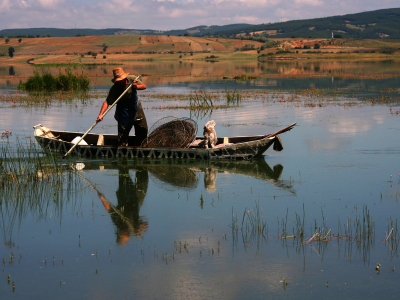
Europe and Central Asia Regional Overview of Food Security and Nutrition 2024
Managing water sustainably for improved food security and nutrition
This report provides the latest updates on hunger, food insecurity and malnutrition in Europe and Central Asia, including the cost and affordability of healthy diets. It also explores the central theme of water security, highlighting its critical connections to agriculture, food security and nutrition. While the region has made progress in reducing hunger and food insecurity (SDG Target 2.1), challenges remain in eliminating all forms of malnutrition (SDG Target 2.2).
Collections
- Country gender assessment series
- Digital agriculture
- Disaster risk reduction and management publication series
- Empowering smallholders and family farms series
- Transboundary animal diseases - Leaflets
Multimedia resources
Publications
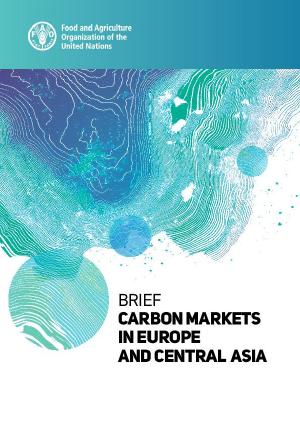
Carbon markets in Europe and Central Asia
07/2025
This brief provides background information to regional and country office staff and FAO partners on the current state of carbon markets in the region. The document also shares recent developments under Article 6 of the Paris Agreement and potential regional needs for the implementation of carbon trading among countries and for the achievement of nationally determined contributions (NDCs).
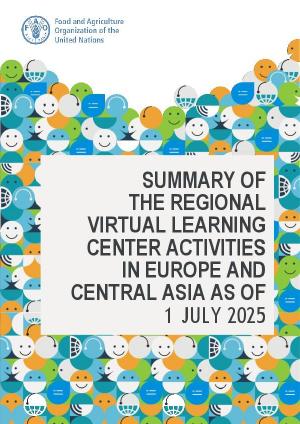
Summary of the regional Virtual Learning Center activities in Europe and Central Asia as of 1 July 2025
06/2025
This fifth issue of the Virtual Learning Center (VLC) for Europe and central Asia (REU) newsletter presents a brief overview of the online courses conducted in the first half of this year and upcoming activities in the second half of 2025. Three online courses were delivered: 1) Tackling Food Loss and Waste throughout the value chain: Pilot in English in March-April 2025; 2) Zoonoses for Field Veterinarians: Pilot in English; and 3) Introduction to One Health in Ukrainian.
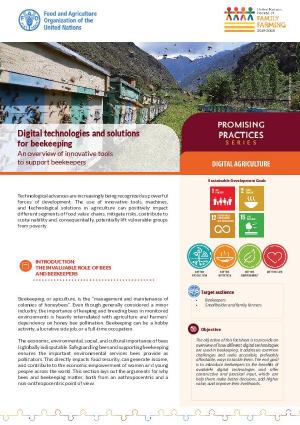
Digital technologies and solutions for beekeeping
04/2025
This fact sheet provides an overview of the various digital technologies used in beekeeping It addresses common challenges and seeks accessible, preferably affordable, ways to tackle them. The end goal is to introduce beekeepers to the benefits of available digital technologies and offer constructive and practical input, which can help them make better decisions, add higher value, and improve their livelihoods.
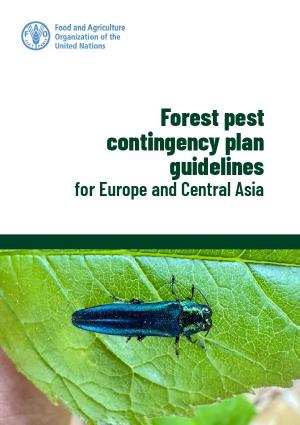
Forest pest contingency plan guidelines for Europe and Central Asia
12/2024
Pest contingency plans (PCP) are used by national or regional plant protection organizations to ensure a plan is in place for when a new pest is detected in a particular country or region, and thus to facilitate a rapid and effective response to manage the situation. This guide outlines and discusses the elements and steps needed to formulate and implement a contingency plan for key forest pests in Europe and Central Asia.
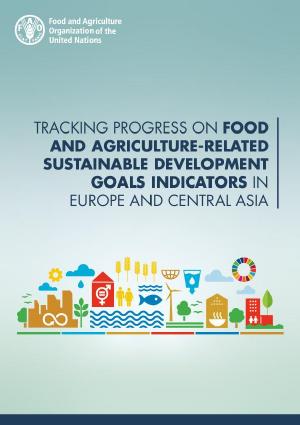
Tracking progress on food and agriculture-related Sustainable Development Goal indicators in Europe and Central Asia
06/2025
The Europe and Central Asia (ECA) region is at a key stage of the 2030 Agenda for Sustainable Development, experiencing progress in various domains – albeit with some areas witnessing limited forward movement or minor reversals. This report advocates for strengthened data systems to support evidence-based decision-making and targeted interventions.
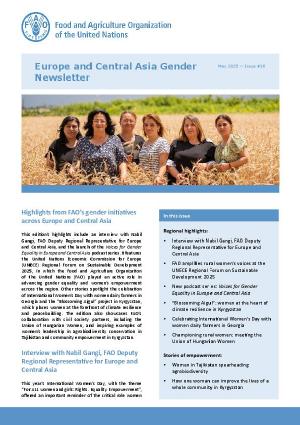
Europe and Central Asia Gender Newsletter, May 2025 – Issue #18
06/2025
This issue of the FAO Europe and Central Asia Gender Newsletter spotlights voices and actions driving gender equality in the region’s agriculture and agrifood systems. The edition opens with an interview with Nabil Gangi, FAO Deputy Regional Representative, and introduces the Voices for Gender Equality in Europe and Central Asia podcast series.
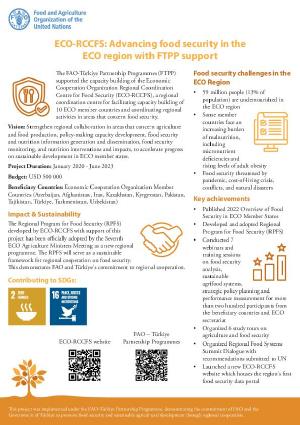
Economic Cooperation Organization Regional Coordination Centre for Food Security (ECO-RCCFS): Advancing food security in the ECO region with FAO-Türkiye Partnership Programmes (FTPP) support
06/2025
This factsheet showcases FTPP’s support for enhancing regional cooperation on food security and sustainable food systems. It presents how FTPP has contributed to the establishment and capacity development of two key regional institutions: the Economic Cooperation Organization Regional Coordination Centre for Food Security (ECO-RCCFS) and the Black Sea Economic Cooperation Center for Sustainable Food Systems (BSEC-CSFS).
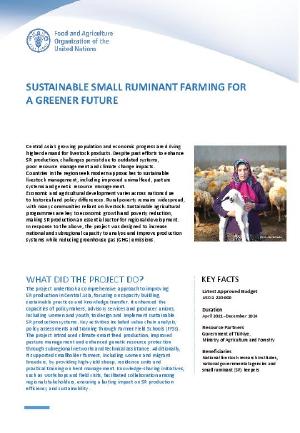
Sustainable Small Ruminant Farming for a Greener Future
04/2025
Central Asia's growing population and economic progress are driving higher demand for livestock products. Despite past efforts to enhance SR production, challenges persist due to outdated systems, poor resource management and climate change impacts. Countries in the region seek modern approaches to sustainable livestock management, including improved animal feed, pasture systems and genetic resource management.
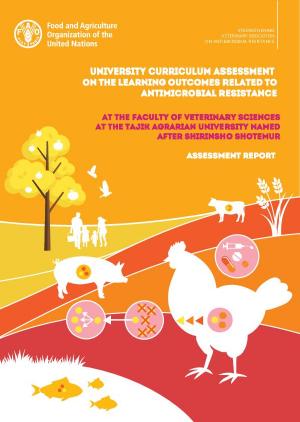
University curriculum assessment on the learning outcomes related to antimicrobial resistance at the Faculty of Veterinary Sciences at the Tajik Agrarian University named after Shirinsho Shotemur
04/2025
The Strengthening Veterinary Education on Antimicrobial Resistance series compiles assessment reports of veterinary education institutions, detailing strengths and areas for improvement in the institutions’ curricula, and recommendations to enhance their education on antimicrobial resistance (AMR) learning outcomes. This issue of the series summarizes the findings of the assessment conducted at the Faculty of Veterinary Sciences at the Tajik Agrarian University in Dushanbe, Tajikistan.
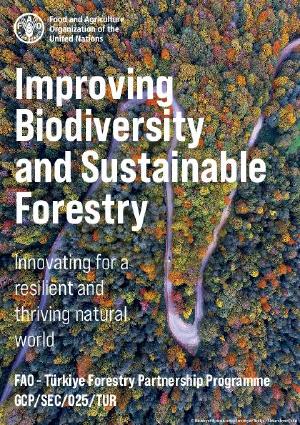
Improving biodiversity and sustainable forestry: Innovating for a resilient and thriving natural world
03/2025
The “Improving Biodiversity and Sustainable Forestry” project is an initiative designed to enhance biodiversity conservation and promote sustainable forest management across Central Asia, the Caucasus, and Montenegro. Implemented under the FAO-Türkiye Forestry Partnership Programme (FTFP) and funded by the Republic of Türkiye, the project directly contributes to regional climate resilience and global biodiversity goals.
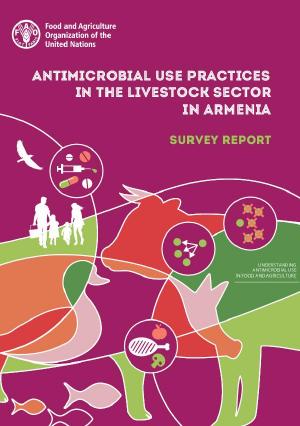
Antimicrobial use practices in the livestock sector in Armenia
04/2025
The Understanding Antimicrobial Use in Food and Agriculture series is a compilation of country reports, each describing antimicrobial use (AMU) practices and awareness of antimicrobial resistance (AMR) in the livestock sector. This report is the first of its kind to provide a comprehensive overview of AMU in the livestock sector in Armenia, including the sources of antibiotics, the main use patterns, the main indications of antimicrobial treatment, drugs used in different animal species...
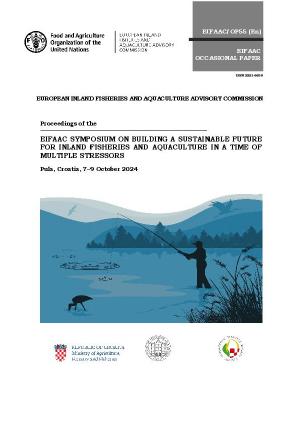
Proceedings of the EIFAAC Symposium on Building a sustainable future for inland fisheries and aquaculture in a time of multiple stressors
04/2025
The international symposium on ‘Building a sustainable future for inland fisheries and aquaculture in a time of multiple stressors’ was organized on 7–9 October 2024 in conjunction with the Thirty-second Session of EIFAAC in Pula, Croatia. The symposium was hosted by the Government of Croatia and the University of Zagreb Faculty of Agriculture. The main documentation comprised 5 invited papers, 50 experience papers and 23 posters.
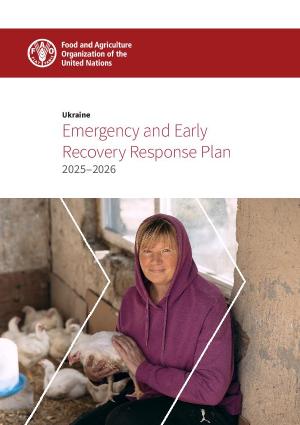
Ukraine: Emergency and Early Recovery Response Plan
04/2025
As the war in Ukraine enters its fourth year, building resilient food systems and fostering early recovery remains a critical challenge, particularly in frontline oblasts, where agriculture-dependent communities face reduced local production, fluctuating food prices and an increasing reliance on external aid. In response, the Food and Agriculture Organization of the United Nations (FAO) has developed the 2025–2026 Emergency and Early Recovery Response Plan (EERRP) to support...
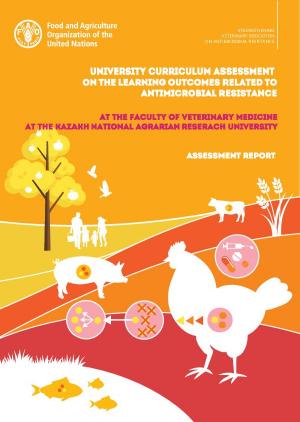
University curriculum assessment on the learning outcomes related to antimicrobial resistance at the Faculty of Veterinary Medicine at the Kazakh National Agrarian Research University
04/2025
The Strengthening Veterinary Education on Antimicrobial Resistance series compiles assessment reports of veterinary education institutions, detailing strengths and areas for improvement in the institutions’ curricula, and recommendations to enhance their education on antimicrobial resistance (AMR) learning outcomes (LOs). This issue of the series summarizes the findings of the assessment conducted at the Faculty of Veterinary Medicine at the Kazakh National Agrarian Research University.
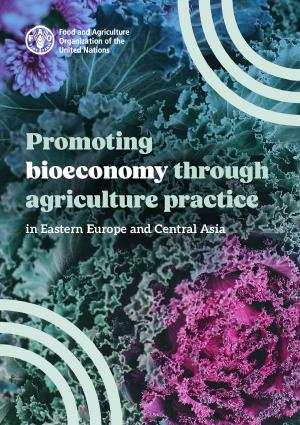
Promoting bioeconomy through agriculture practice in Eastern Europe and Central Asia
01/2025
This report, published by the Food and Agriculture Organization of the United Nations (FAO), explores the promotion of bioeconomy through sustainable agricultural practices in Eastern Europe and Central Asia. The analysis highlights the critical role of sustainable and circular bioeconomy in addressing environmental, social, and economic challenges, particularly in the agrifood sector.
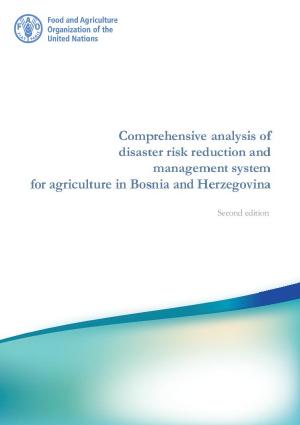
Comprehensive analysis of disaster risk reduction and management system for agriculture in Bosnia and Herzegovina
03/2025
This report aims to highlight the current strengths of the institutional disaster risk reduction (DRR) system for agriculture in Bosnia and Herzegovina as well as indicate existing gaps and capacity needs to further enhance it. A comprehensive assessment is conducted, which includes a general overview of the country’s agricultural sector and outlines the most frequent natural hazards that are impacting the sector.
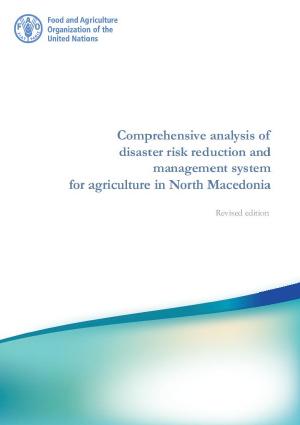
Comprehensive analysis of disaster risk reduction and management system for agriculture in North Macedonia
09/2024
This report aims to highlight the current strengths of the institutional disaster risk reduction (DRR) system for agriculture in North Macedonia as well as indicate existing gaps and capacity needs to further enhance it. A comprehensive assessment is conducted, which includes a general overview of the country’s agriculture sector and outlines the most frequent natural hazards impacting it.
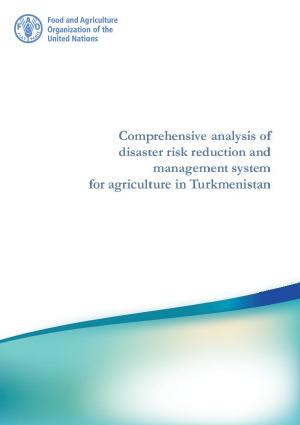
Comprehensive analysis of the disaster risk reduction system for the agriculture sector in Turkmenistan
09/2024
This report aims to highlight the current strengths of the institutional DRR system for agriculture in Turkmenistan as well as indicate existing gaps and capacity needs to further enhance it. A comprehensive assessment is conducted, which includes a general overview of the country’s agricultural sector and outlines the most frequent natural hazards that are impacting the sector.
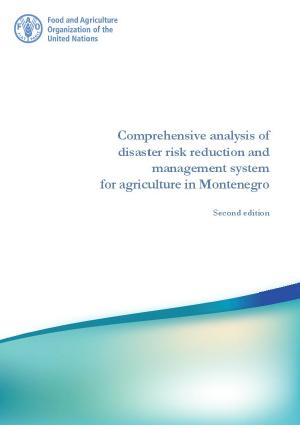
Comprehensive analysis of disaster risk reduction and management system for agriculture in Montenegro
01/2024
This report aims to highlight the current strengths of the institutional disaster risk reduction (DRR) system for agriculture in Montenegro as well as indicate existing gaps and capacity needs to further enhance it. A comprehensive assessment was conducted, which includes a general overview of the country’s agriculture sector and outlines the most frequent natural hazards that are impacting the sector.
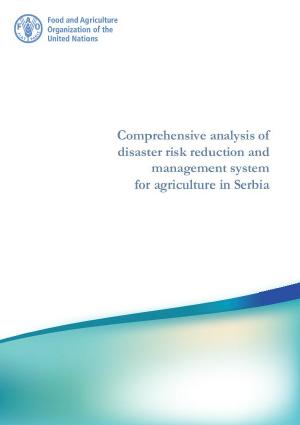
Comprehensive analysis of disaster risk reduction and management system for agriculture in Serbia
01/2024
This report aims to highlight the current strengths of the institutional disaster risk reduction (DRR) system for agriculture in Serbia as well as indicate existing gaps and capacity needs to further enhance it. A comprehensive assessment is conducted, which includes a general overview of the country’s agriculture sector and outlines the most frequent natural hazards that are impacting the sector.
